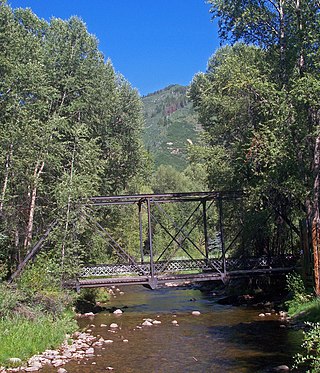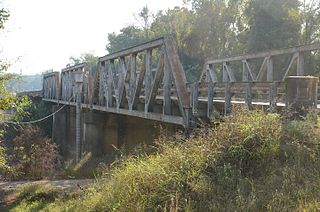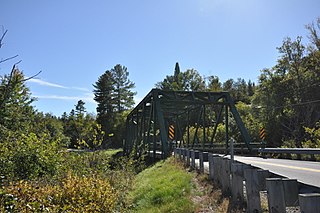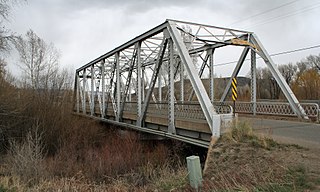
U.S. Route 64 is a U.S. route running from Teec Nos Pos, Arizona east to Nags Head, North Carolina. In the U.S. state of Arkansas, the route runs 246.35 miles (396.46 km) from the Oklahoma border in Fort Smith east to the Tennessee border in Memphis. The route passes through several cities and towns, including Fort Smith, Clarksville, Russellville, Conway, Searcy, and West Memphis. US 64 runs parallel to Interstate 40 (I-40) until Conway, when I-40 takes a more southerly route.

The Dodd Ford Bridge is a bridge spanning the Blue Earth River about 1 mile (2 km) southwest of Amboy, Minnesota, in Blue Earth County, Minnesota.

The St. Louis-San Francisco Overpass is a pony and deck truss bridge built in 1937 located in Imboden, Lawrence County, Arkansas. It carries U.S. Route 62 and Arkansas Highway 115 over the Spring River and the former St. Louis-San Francisco Railroad for 1,049.9 feet (320.0 m). The bridge has three Pratt deck trusses, each 112 feet (34 m) in length, and three Parker pony trusses, also 112 feet (34 m) long, with the balance of the bridge length in steel girder truss spans. The bridge is 24 feet (7.3 m) wide.

The Columbia River Bridge at Wenatchee, Washington, also known as the Old Wenatchee Bridge and W.T. Clark Pipeline Bridge was built by the Washington Bridge Company in 1908, primarily as a means to carry irrigation water pipelines across the Columbia River. It was the first road bridge over the Columbia south of Canada. The bridge is a pin-connected cantilever truss, 1,600 feet (490 m) long, with one 200-foot (61 m) Pratt truss between two 160-foot (49 m) cantilever arms, with 240-foot (73 m) side arms and a 60 feet (18 m) girder span. The bridge was purchased by the Washington highway department for $182,000 for highway use. As originally built, the bridge carried a 20.5-foot (6.2 m) wide timber roadway, with additional ability to carry a street railway. However, the east approach to the bridge was built at a 6% grade, limiting its potential.

The Sheely Bridge, originally known as the Carbondale Bridge, carries pedestrian traffic across the Roaring Fork River at Mill Street Park in Aspen, Colorado, United States. It is a short steel truss bridge originally located downstream in Carbondale and later moved to its present location.

The AJX Bridge is a historic Pratt truss bridge in southwestern Johnson County, Wyoming. The bridge was built in 1931 across the South Fork of the Powder River near Kaycee, Wyoming. AJX Bridge was built to provide a river crossing for U.S. Route 87. It was placed on the National Register of Historic Places in 1985 as part of a Multiple Property Submission devoted to historic bridges in Wyoming.

The ENP Bridge over Green River is a historic bridge located near Daniel, Wyoming in the UNited States, which carries Sublette County Road CN23-145 across the Green River. The Western Bridge and Construction Company built the bridge circa 1905. The 221-foot-11-inch (67.64 m) bridge has two spans, both Pratt trusses; the longer span is a Pratt through truss, while the shorter is a Pratt pony truss. The use of both through and pony trusses in the same bridge was uncommon in Wyoming, and the bridge is the only surviving example of a Pratt truss bridge in this style.

The ETD Bridge over Green River is a steel girder bridge near Fontenelle, Wyoming, which carries Sweetwater County Road CN4-8SS over the Green River. The bridge is a replacement for a historic Pratt through truss bridge built in 1913 by the Colorado Bridge and Construction Company. The 150-foot-long (46 m) bridge was one of the longest Pratt through truss bridges built in the early stages of Wyoming bridge construction.

The Prowers Bridge over the Arkansas River near Prowers, Colorado is a historic bridge that was built in 1902 by the Pueblo Bridge Co. It includes 3 Camelback truss, 2 Pratt through truss and one Pratt pony truss components. It was listed on the National Register of Historic Places in 1985.

The Ben Laney Bridge is a historic bridge carrying U.S. Route 79 Business over the Ouachita River in Camden, Arkansas. The steel Pratt truss bridge was built in 1945–47, and dedicated to Acting Governor Benjamin Travis Laney. Its construction was delayed due to a shortage of steel. The bridge consists of three trusses with a total span of 129 feet (39 m), resting on reinforced concrete piers and abutments. The bridge also includes a 548-foot (167 m) approach of I-beam decking, which was built in 1934.

The Hale Creek Bridge is a historic bridge carrying County Road 271 over Hale Creek in Sevier County, Arkansas, near the village of Red Wing and about halfway between De Queen and Dierks. It consists of a single-span Pratt pony truss 30 feet (9.1 m) long, resting on concrete abutments. The bridge deck is 18 feet (5.5 m) wide and is surfaced in gravel. When the bridge was built in 1919, the roadway it carried was the major east–west route in the area. In 1926 this route was designated U.S. Route 70. It retained this designation until the current alignment of US 70 was built in 1952. The bridge is a fine local example of a Pratt truss bridge.

The Bloomfield-Nulhegan River Route 102 Bridge is a historic bridge in Bloomfield, Vermont. It carries Vermont Route 102 over the Nulhegan River, near its mouth at the Connecticut River just south of Bloomfield Village. Built in 1937, it is a well-preserved example of a Pratt through truss, exhibiting then state-of-the-art engineering. It was listed on the National Register of Historic Places in 1991.

The South Newfane Bridge is a historic bridge, carrying Parish Hill Road across the Rock River in the village of South Newfane, Vermont. It is a Pratt through truss span, manufactured from rolled I-beams in 1939 to replace a bridge washed away in flooding. It was listed on the National Register of Historic Places in 1992.
The Cove Creek Bridge was a historic bridge in rural eastern Conway County, Arkansas. It carried Arkansas Highway 124 across Cove Creek, just west of the hamlet of Martinsville, and west of the city of Twin Groves. It was a three-span steel structure with a total length of 267 feet (81 m). The main span was a Pratt through truss 101 feet (31 m), mounted on concrete piers, while the approach spans on either end were smaller pony trusses each 83 feet (25 m) long. The bridge was built in 1957, and was the one of few Pratt truss bridges in the state.

The Petit Jean River Bridge was a historic bridge in rural northeastern Yell County, Arkansas. It is located north of Ola, and carries County Road 49 across the Petit Jean River. It was a single-span Pratt through truss, with a truss length of 119 feet (36 m) long, and a total structure length of 159 feet (48 m). The trusses rest on concrete pillars. The bridge was 12 feet (3.7 m) wide, allowing for a single lane of traffic. Built in 1930, it was one of three Pratt truss bridges in the county. On February 1, 2019, the bridge was destroyed by an undertrained trucker who was unable to comprehend the clearly marked weight limits of the structure

The Bridgewater Corners Bridge carries Vermont Route 100A across the Ottauquechee River in the Bridgewater Corners village of Bridgewater, Vermont. It was built in 1928 by the American Bridge Company, following devastating flooding. It is a single-span Pratt through truss structure, and was listed on the National Register of Historic Places in 1992.

The Quechee Gorge Bridge is a historic bridge, carrying U.S. Route 4 (US 4) across Quechee Gorge, near the Quechee village of Hartford, Vermont. Built in 1911, it is Vermont's oldest surviving steel arch bridge. It was listed on the National Register of Historic Places in 1990.

The Middlesex–Winooski River Bridge is a steel girder bridge carrying U.S. Route 2 (US 2) across the Winooski River in a rural area on the town line between Moretown and Middlesex, Vermont. The two-span bridge was built in 2010, replacing a 1928 three-span Pratt through truss, which was listed on the National Register of Historic Places in 1991.

The Railroad Street Bridge is a historic Pratt through truss bridge, carrying Railroad Street across the Lamoille River in Johnson, Vermont. It was built in 1928, after the state's devastating 1927 floods, and is one of its few surviving Pratt through truss bridges. It was listed on the National Register of Historic Places in 2007 as Bridge 6.

Gunnison River Bridge I and Gunnison River Bridge II are two 129 feet (39 m) long bridges built during 1926–27. They were separately listed on the National Register of Historic Places in 2002.





















